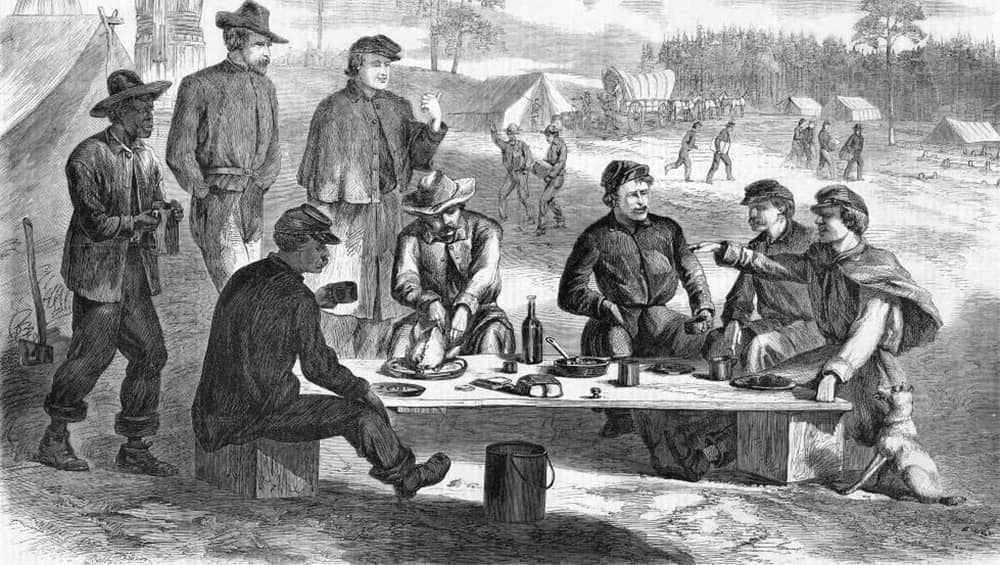
PIKE COUNTY, Mo. — It wasn’t hard to get hoodwinked during the Civil War in Pike County.
Combatants often did not wear uniforms, families swore untrue allegiances to escape harm and minors either fibbed about their age to enlist or ignored the rules altogether.
So, it came as no surprise when James Chandler was offered what he and his buddies came to call “a bushwhacker dinner.” The incident was a reminder about the sometimes-difficult task of recognizing the enemy, and left an astonished rebel eating crow.
The conflict in Pike County was more about territorial practicality than formal appearance, and it was a lot different than the fighting elsewhere. Sentiments among the populace were divided about equally.
So, divisions between neighbors and even families were significant, and could be deadly.
“In a guerilla war, where both sides wandered in small bands rather than marching in large columns, part of the terror for civilians was that they could never know for certain to whom they were talking and therefore could trust no one,” wrote author Michael Fellman. “Even old friends might have made deadly secret alliances.”
On Oct. 12, 1864, Chandler and five other militiamen were trying to track down Confederate Capt. Erasmus Woods.
The Troy native was part of Louisiana rebel Caleb Dorsey’s command, and was recruiting Southern sympathizers from Illinois to fight in Missouri.
The Union men were decked out in civilian clothes. They hadn’t had any luck finding Woods and were contemplating their next move when a man approached on horseback. His name was William Banks, and he also was looking for Woods, but for another reason.
“I asked him what he wanted with the captain,” Chandler reported. “He said he had some dinner for him. I told him ‘All OK, the captain will be up directly.’ I then told him that we would take care of the dinner and him, too.”
Banks had a bluecoat epiphany and quickly stammered out a lie, telling Chandler he was “forced to bring the dinner and was afraid” he’d be shot by the Confederates if he didn’t.
Chandler couldn’t resist badgering Banks, telling the young man that begging was useless because Southern sympathizers never let Union captives plead for their lives.
Banks certainly was aware of what could happen to those who supported Confederate guerillas. Fellman wrote that “often such collaborators were ‘shot while trying to escape’ as the formula went.”
Chandler wanted to execute Banks, but was overruled by a commander. Instead, he was taken into custody. Chandler searched Banks’ saddlebag for weapons. He instead discovered “two legs of chicken, some cold beef, pickles, pies and bread” – which the Union men labeled the perfect feast for rebel agitators.
“Banks may have been a willing collaborator, or he may have been coerced by the guerillas,” Fellman said. “Chandler did not think it unfair to trick Banks this way – had Banks been shot rather than arrested, Chandler would have omitted to write such an account. Banks’ death, if reported, simply would have been described as a guerilla shot, and there would have been no repercussions.”
A couple of weeks later, Woods and 25 of his men showed up in Wentzville with orders from Gen. Sterling Price to “conscript unwilling men,” wrote author Bruce Nichols. Woods thought better of it and “harmed nobody” before leaving.
The fate of those involved isn’t recorded, but businessman J.L. Morgan chastised both sides for their treachery. Morgan was a North Carolina tobacco merchant who had dealings in Missouri, and Pike County was a prime market.
“Low-lived men who claim to be Union or Rebel as occasion requires (ride) the country destroying life and property, regardless of law and usages of regular warfare,” he said.
Fellman called it the “worst guerilla war” in the nation’s history.
“Ordinary people, civilians as well as soldiers, were trapped by guerilla war in a social landscape in which almost nothing remained recognizable or secure,” he wrote.